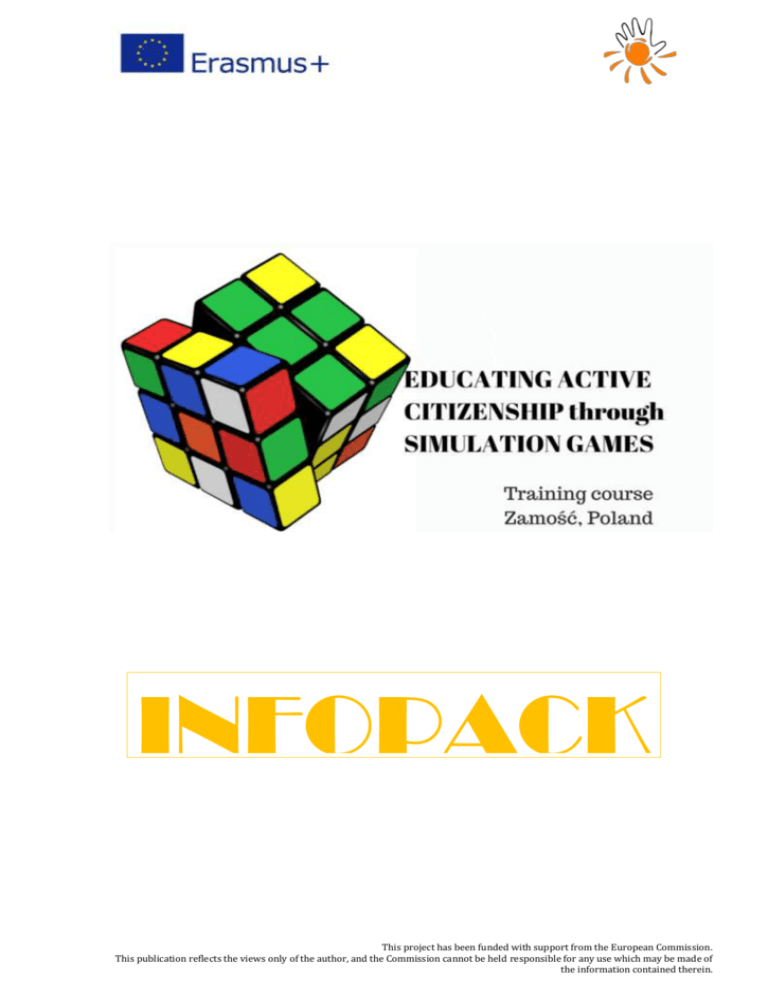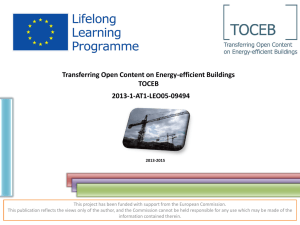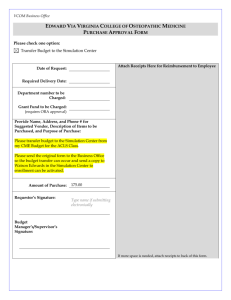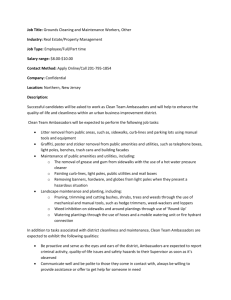INFOPACK What? When? Where? With whom? Title: “Educating
advertisement

INFOPACK This project has been funded with support from the European Commission. This publication reflects the views only of the author, and the Commission cannot be held responsible for any use which may be made of the information contained therein. What? When? Where? With whom? Title: “Educating Active Citizenship through Simulation Games” Type of event: Training course Dates and Location of the Seminar: 22-29 May 2015, Zamość, Poland. Who: youth leaders and youth workers working with youth from deprived urban areas from France, Greece, Hungary, Italy, Lithuania, Poland, Romania, Spain, Turkey. What is seminar about? Simulation activities and role games are strong tools for educating active citizenship among youth. These tools are built on the experiential learning approach that help participants to live through the game and get real experience. The method can be used for different educational aims. Through this method, the youth may acquire new skills and competences. The project addresses the issues of lacking new methods, which will be more interesting for young people to participate in, especially when it comes to youth from deprived urban area; low level of active participation of youth from deprived urban areas in local communities. Aims and objectives of the training: - to provide youth workers and youth leaders with the tools of involving youth to active participation in the local communities; - to foster the potential of youth in active participation in the local level and influence the local youth policy; - to introduce and practice the role-playing and simulation games method (structure, specifications, usage, adaptation for the certain needs, creation of the games); - to teach participants how to use this method for teaching young people to be active citizens on the local level; - to create new role-playing games and simulation activities based on the participants’ realities, which will be used in the future for teaching young people to be active citizens and to influence the decision-making processes on the local level. Learning outcomes: The participants of the TC will learn about the method of the role-playing simulation games: ways of using the method, adaptation of different simulation games and role-playing games to certain leaning purposes, and development of simulation activities based on the local realities. The participants will develop their own simulation games and try them out during the training course. Participants profile: The participants of the training course are: - youth leaders and youth workers working with youth from deprived urban areas. - Age of participants 18 +. This project has been funded with support from the European Commission. This publication reflects the views only of the author, and the Commission cannot be held responsible for any use which may be made of the information contained therein. - Availability of youth environment to implement the acquired skills and knowledge. - Efficient level of English. Methodology: The methodology of the training course will be built on non-formal education methods, intercultural learning, experiential and participatory approaches. The programme of the training course will consist of the following phases: - getting-to-know each other and integration (ice-breakers, name games, getting-to-know each other games, team-building and integration activities), - setting common ground (presentation of the programme, aims and objectives of the TC, expectations of participants from the TC, presentation of Erasmus +, introduction to YouthPass, presentations of organizations of participants), - theoretical phase about simulation and role-playing games (structure, specifications, usage, adaptation for the certain needs, creation of the games(matrix of the game)), - practical phase (development of the games, conducting the games for local youth), - planning of follow-up activities and evaluation. Working language: English. Coordinating and hosting organization: Zamojskie Voluntary Service Association was established In 2002. Main goal of Association is to promote Voluntary service in Lubelskie region and coordination of voluntary actions. It cooperates with high school and university voluntary clubs. The organization promotes international cooperation in frames of voluntary service (Youth in action, Polish German Youth Cooperation, Polish Lithuanian Youth Fund). From 2008 it coordinates project “Restoring to the local community through care. Polish-German Partnership for the Improvement of Life for the People of the Zamojszczyzna Region Afflicted by the Third Reich” financed by the Foundation “Remembrance, Responsibility and Future” in Berlin and carried out as a part of the programme “Aiding the readiness to help – international partnerships for helping the senior citizens in East-Central Europe and Israel.” Zamojskie Voluntary Service Association has been conducting different educational activities for educating active citizenship among local youth in cooperation with local voluntary clubs. The organization has an experience in development and conducting simulation activities for local youth as well as organizing international educational activities with applying simulation games as the tool for educating youth about active citizenship. To check information about the hosting organization, please, visit the web-site: http://wolontariatzamosc.pl/ and on Zamojskie Voluntary Service Association Facebook Page Accommodation and Food: This project has been funded with support from the European Commission. This publication reflects the views only of the author, and the Commission cannot be held responsible for any use which may be made of the information contained therein. The venue of the training course is situated in the very center of Zamość. Accommodation: 2 pax/room Address: Pokoje Gościnne Arkadia, Rynek Wielki 9, Zamość, Poland Hotel website: http://www.arkadia-zamosc.com.pl/galeria/# Internet Access: Wi-Fi connection is available at the venue Travel Arrangements: The day of arrival to Ukraine: 22 May 2014 before 19:00 The day of departure: 29 May 2014 after breakfast How to get to Poland: The nearest airports - Fryderyk Chopin airport in Warsaw, Modlin airport Warsaw. How to get to Zamość: We will rent the bus to help you in last part of your trip. You will be informed about meeting point and time when we will have information about all arrivals. Our volunteer will meet you at the airport. Crossing the border and identification in Poland: Citizens of the EU countries can cross border with ID only. Turkish representatives may need visas (if they do not have green passport). In case if the visa is needed you will be provided with the invitation. If it is your case you will need to contact us with this request at erasmusplus@wolontariatzamosc.pl. Travel costs Reimbursement of the travel costs will only be done upon presentation of all (including return) original tickets, receipt/invoices and boarding passes and later sending of the return documents and boarding passes. Please, be aware that in case you will miss any invoices or tickets during the training course, we will not be able to reimburse them. Please, keep the boarding passes from your airport check in as well. Reimbursement will be done in EURO, regardless of the currency indicated on your ticket and receipt/invoice according to the official currency exchange rate of European Commission. !!! Note: Please check the travel budget limits below. If your travel costs exceed the amount budgeted in the project, we will be able to reimburse you only the sum indicated in the travel budget. Country Amount per person France 275 EUR Greece 275 EUR Hungary 180 EUR This project has been funded with support from the European Commission. This publication reflects the views only of the author, and the Commission cannot be held responsible for any use which may be made of the information contained therein. Italy 275 EUR Lithuania 180 EUR Romania 275 EUR Spain 360 EUR Turkey 275 EUR Insurance Make sure that you have European Health insurance Card and Accidents after effects policy. The approximate price of it is 8-10 EUR. Please, send us the scan of it before the training course and bring the original with you. Paper routine NB! Please, make sure that you fill out and send the following documents till 11 May, 2015: Participants Profile for the YouthPass certificates Participant Contract signed and scanned and to bring originals with you We will ask you to bring two documents from your sending organizations: Partnership contract Originals of the Mandates Check list Be sure you have all this done before you leave! read this guide all the way through at least once packed your travel bag – including traditional food & drinks and info materials about your organisation, took Partnership Contract and Originals of the Mandates from your organization sent by e-mail Participants Profile for the YouthPass Certificate, Participant Contract and took the original with you joined Facebook group https://www.facebook.com/groups/597573563709329/ and implemented some activities which you will find there changed the batteries in your alarm clock and taken the charging cable for your mobile This project has been funded with support from the European Commission. This publication reflects the views only of the author, and the Commission cannot be held responsible for any use which may be made of the information contained therein. prepared lots of good mood for the whole week. Partners MJC Firminy (www.mjc-firminy.fr) – France CEMEA Rhône-Alpes (www.cemearhonealpes.org) – France Utilapu Nemzetkozi Epitotabor Halozat (utilapu.hu) – Hungary ASOCIATIA UNIVERSITUR (www.universitur.ro) – Romonia Dinamik Gelisim Dernegi (www.dd.org.tr) – Turkey Hub - Officine Giovanili (www.hubofficinegiovanili.eu) – Italy ASOCIACION CULTURAL SENDE – Spain European Foundation of Human Rights (efhr.eu) – Lithuania Green Spirit (http://www.greenspirit.com/) Greece The Youth Peace Ambassadors Network: The Youth Peace Ambassadors (YPA) network is an informal network of young peace builders across Europe who work with and in conflict-affected communities through youth work, This project has been funded with support from the European Commission. This publication reflects the views only of the author, and the Commission cannot be held responsible for any use which may be made of the information contained therein. including educational activities such as training sessions, seminars, peer education, as well as advocacy and activism projects. The mission of the Youth Peace Ambassadors Network is to develop a culture of peace by empowering young people, promoting human rights, dignity, equality and respect of diversity through education, advocacy and other actions. You can follow the Youth Peace Ambassadors Network on Facebook The creation of the Youth Peace Ambassadors Network is a result of a long-term project (entitled Youth Peace Ambassadors) that was proposed by the Advisory Council on Youth and endorsed by the Joint Council on Youth of the Council of Europe in 2010. During various phases of the project, its members participated in several training sessions on competences in peace-building. The Youth Peace Ambassadors project was initially divided into three groups, but, after following a similar path of learning, one big group was created: the Youth Peace Ambassadors Network. In November 2012, a networking conference took place where the participants of all groups had a chance to meet and the first steps of the Youth Peace Ambassadors Network were taken. You can read more about the Council of Europe project at: http://www.youthpeace.coe.int Contacts: In case of any technical and logistical questions connected with the training course, please, contact at erasmusplus@wolontariatzamosc.pl This project has been funded with support from the European Commission. This publication reflects the views only of the author, and the Commission cannot be held responsible for any use which may be made of the information contained therein.





